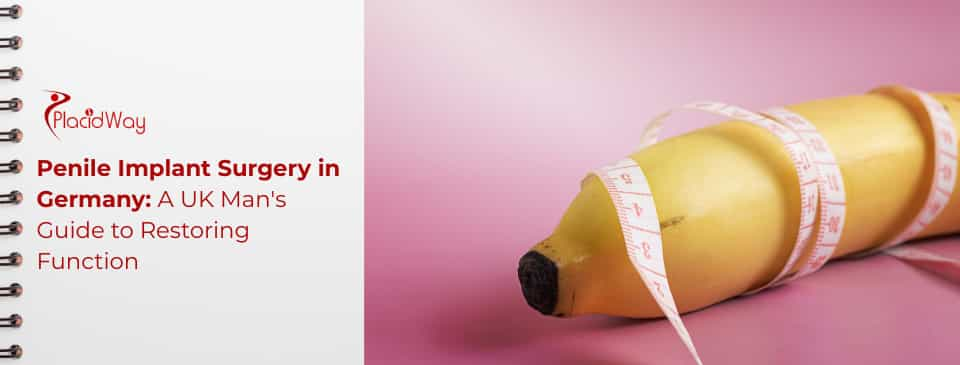
Are you a UK man considering penile implant surgery to restore function and confidence? Germany has emerged as a leading destination for medical tourism, offering advanced urological care and state-of-the-art procedures for erectile dysfunction (ED). This guide provides comprehensive information to help you navigate your journey, from understanding the types of implants to recovery and cost considerations.
Key Takeaways
-
Penile implant surgery offers a permanent and effective solution for severe erectile dysfunction (ED) when other treatments have failed.
-
Germany boasts world-class medical facilities, highly skilled urologists, and stringent healthcare standards, making it a top choice for international patients seeking penile prosthesis implantation.
-
Patient satisfaction rates with penile implants in Germany are remarkably high, often ranging from 75% to 97%.
-
The average cost for penile implant surgery in Germany typically ranges from €10,655 to €14,122 (approximately £9,000 to £12,000), depending on the implant type and clinic.
Understanding Penile Implant Surgery
Penile implant surgery is a highly effective treatment option for men experiencing severe erectile dysfunction (ED), particularly when less invasive treatments like oral medications, injections, or vacuum devices have not yielded satisfactory results. This procedure involves surgically placing a penile prosthesis inside the penis, enabling men to achieve an erection suitable for sexual intercourse. It's a significant decision that can profoundly impact a man's quality of life, restoring not only physical function but also confidence and intimacy.
Germany's reputation for medical excellence, cutting-edge technology, and experienced urological surgeons makes it an attractive destination for UK men seeking this life-changing procedure. German clinics adhere to rigorous quality standards, ensuring patient safety and optimal outcomes.
Did You Know? Germany treats over 250,000 international patients annually, with a significant number seeking complex surgical procedures due to the country's high-quality medical infrastructure and specialized expertise.
Types of Penile Implants
There are two primary types of penile implants: inflatable implants, which are the most common and offer a more natural erection and flaccidity, and malleable (semirigid) implants, which provide constant rigidity.
Choosing the right type of penile implant is a crucial decision made in consultation with your urologist, taking into account your medical history, personal preferences, and lifestyle.
Inflatable Penile Implants
Inflatable implants are the most popular choice due to their ability to provide a more natural erection and a flaccid state when deflated. They consist of:
-
Three-piece inflatable implants: These are the most common and sophisticated. They include two inflatable cylinders placed inside the penis, a fluid-filled reservoir implanted under the abdominal wall, and a pump with a release valve located in the scrotum. To achieve an erection, you squeeze the pump in the scrotum, which transfers fluid from the reservoir into the cylinders. To deflate, you press the release valve, returning the fluid to the reservoir. This type offers the most natural-looking erection and flaccidity.
-
Two-piece inflatable implants: Similar to three-piece implants, but the fluid reservoir is combined with the pump in the scrotum. While they offer good rigidity, the flaccid state may not be as complete as with a three-piece system.
Advantages of Inflatable Implants:
-
Provides a natural-feeling erection
-
Allows for a natural flaccid state
-
High patient and partner satisfaction rates
Disadvantages of Inflatable Implants:
-
More mechanical parts, increasing the potential for malfunction
-
Requires manual dexterity to operate
-
Slightly more complex surgical procedure
Malleable (Semirigid) Penile Implants
Malleable implants consist of two bendable rods surgically placed inside the penis. These rods are always firm, providing constant rigidity. The penis can be manually positioned for sexual activity or bent downwards for concealment under clothing.
Advantages of Malleable Implants:
-
Simpler design with fewer parts, leading to a lower risk of mechanical failure.
-
Easy to use, ideal for men with limited manual dexterity.
-
Shorter surgical procedure.
Disadvantages of Malleable Implants:
-
The penis remains semi-rigid at all times, which may be noticeable under tight clothing.
-
Does not offer a completely flaccid state.

Candidacy for Penile Implant Surgery
Penile implant surgery is typically recommended for men with organic erectile dysfunction who have not responded to other less invasive treatments, or for whom other treatments are contraindicated.
Determining if you are a suitable candidate for penile implant surgery involves a comprehensive evaluation by a urologist. This procedure is generally considered for men who:
-
Have persistent or severe erectile dysfunction: Especially if ED is due to underlying medical conditions such as diabetes, prostate cancer treatment (e.g., radical prostatectomy or radiation therapy), Peyronie's disease, or spinal cord injury.
-
Have failed other ED treatments: This includes oral medications (PDE5 inhibitors like Viagra or Cialis), vacuum erection devices, or penile injections (intracavernosal injections).
-
Are in good overall health: While age is not a contraindication, patients should be healthy enough to undergo general anesthesia and surgery.
-
Have realistic expectations: Understanding the benefits and potential risks of the surgery is crucial for patient satisfaction.
-
Do not have active infections: Any urinary tract, skin, or systemic infection must be resolved before surgery to minimize the risk of implant infection.
Your urologist in Germany will conduct a thorough medical history review, physical examination, and potentially additional diagnostic tests to assess your suitability and discuss the best implant option for you.
The Penile Implant Procedure
The penile implant procedure involves surgically inserting the chosen prosthesis into the corpora cavernosa of the penis, typically lasting between one to two hours under general anesthesia.
The penile implant surgery is a meticulous procedure performed by a highly skilled urological surgeon. Here's a general overview:
-
Anesthesia: The surgery is typically performed under general anesthesia, ensuring you are unconscious and pain-free throughout the procedure.
-
Incision: The surgeon makes a small incision, usually in the scrotum or above the pubic bone. The exact location depends on the type of implant and the surgeon's preference.
-
Implant Placement:
-
For inflatable implants, the cylinders are inserted into the corpora cavernosa (the natural erection chambers of the penis). The pump and valve are placed in the scrotum, and the fluid reservoir is positioned behind the abdominal wall.
-
For malleable implants, the two semi-rigid rods are inserted directly into the corpora cavernosa.
-
-
Closure: Once the implant components are correctly positioned and tested, the incisions are carefully closed with sutures. A catheter may be inserted temporarily to drain urine.
The duration of the surgery can vary from one to two hours, depending on the complexity and the type of implant being used. German surgeons often utilize advanced techniques to minimize invasiveness and optimize recovery.
Recovery and Aftercare
Recovery from penile implant surgery typically involves a few weeks of restricted activity, pain management, and careful adherence to post-operative instructions to ensure proper healing and integration of the implant.
After penile implant surgery, a smooth recovery is vital for successful outcomes. Here's what UK men can generally expect:
-
Hospital Stay: Most patients stay in the hospital for 1-2 days post-surgery for monitoring and initial pain management.
-
Immediate Post-Operative Period: You will experience some pain, swelling, and bruising in the penile and scrotal areas. Pain medication will be prescribed to manage discomfort. Elevating the scrotum and applying ice packs (indirectly, wrapped in a cloth) can help reduce swelling.
-
Activity Restrictions:
-
Avoid strenuous activity and heavy lifting for at least 4-6 weeks to prevent strain on the surgical site.
-
Sexual activity should be avoided for 4-8 weeks, or as advised by your surgeon, to allow for complete healing.
-
Patients are usually advised to avoid activating their inflatable implant for the first 2-4 weeks to promote incision healing.
-
-
Wound Care: Keep the incision site clean and dry. Your surgeon will provide specific instructions on dressing changes and showering.
-
Follow-up Appointments: Regular follow-up appointments with your German surgeon are crucial to monitor healing, address any concerns, and provide guidance on using the implant. For inflatable implants, your surgeon will teach you how to operate the device.
Expert Insight: "Adherence to post-operative care instructions is paramount for the long-term success of a penile implant. Patients who diligently follow their surgeon's advice on activity restrictions and wound care significantly reduce their risk of complications and experience faster, more comfortable recoveries,"
Potential Risks and Complications
While penile implant surgery has a high success rate, as with any surgical procedure, there are potential risks and complications, including infection, mechanical malfunction, and persistent pain.
While penile implant surgery is generally safe and effective, it's essential to be aware of potential risks and complications:
-
Infection: This is the most serious complication, occurring in approximately 1-3% of cases. Symptoms include fever, persistent pain, redness, swelling, or discharge at the surgical site. Infections often require removal of the implant and, in some cases, a replacement at a later date. Surgeons take extensive precautions, including prophylactic antibiotics and sterile techniques, to minimize this risk.
-
Mechanical Malfunction: Although modern implants are highly durable, mechanical failure (e.g., leakage from cylinders or pump issues) can occur over time, requiring revision surgery.
-
Pain: While post-operative pain is expected and managed with medication, some men may experience persistent pain.
-
Numbness or Change in Sensation: Rarely, nerve damage can occur, leading to changes in penile sensation.
-
Erosion: In very rare cases, the implant can erode through the skin, requiring removal.
-
Hematoma/Bleeding: Accumulation of blood under the skin (hematoma) or excessive bleeding can occur, sometimes requiring drainage.
German penile implant surgery clinics are equipped with advanced diagnostic tools and experienced medical teams to manage any complications effectively.
Cost of Penile Implant Surgery in Germany
The cost of penile implant surgery in Germany can vary significantly based on the type of implant, the chosen clinic, the surgeon's fees, and additional services like accommodation and translation.
For UK men considering penile implant surgery in Germany, understanding the financial aspects is crucial. While the exact cost will depend on individual circumstances, here's an estimated breakdown:
|
Procedure Component |
Estimated Cost Range (EUR) |
Estimated Cost Range (GBP) |
Notes |
|---|---|---|---|
|
Inflatable Penile Implant |
€12,000 - €18,000 |
£10,000 - £15,000 |
Includes prosthesis, surgeon's fee, anesthesia, hospital stay (1-2 nights), initial consultations. More complex due to multiple components. |
|
Malleable Penile Implant |
€10,000 - €15,000 |
£8,500 - £12,500 |
Includes prosthesis, surgeon's fee, anesthesia, hospital stay (1-2 nights), initial consultations. Simpler, thus often less expensive. |
|
Pre-operative Tests |
€300 - €800 |
£250 - £680 |
Blood tests, imaging (ultrasound), cardiac assessment. |
|
Follow-up Consultations |
€100 - €300 per visit |
£85 - £250 per visit |
Post-operative checks, implant activation training. Usually included in packages. |
|
Accommodation (1 week) |
€700 - €1,500 |
£600 - £1,300 |
Depending on hotel class and location. |
|
Flights (UK-Germany return) |
€100 - €400 |
£85 - £350 |
Varies by airline, booking time, and airport. |
|
Translation Services |
€50 - €150 per day |
£40 - £120 per day |
Often included in medical tourism packages or provided by clinics. |
|
Medication (Post-op) |
€50 - €150 |
£40 - £120 |
Painkillers, antibiotics. |
|
Total Estimated Cost |
€12,000 - €20,000+ |
£10,000 - £17,000+ |
This is a broad estimate. Always get a personalized quote. |
Comparative Costs: While penile implant surgery in the UK can cost upwards of £20,000 to £30,000 privately, Germany often offers a more affordable option without compromising on quality. Patients from Western countries often save 40-65% by opting for medical tourism in destinations like Germany or Turkey.
Note: The exchange rate used for conversion (GBP to EUR) is approximate and subject to fluctuations.
Why Choose Germany for Penile Implants?
Germany is a top destination for penile implant surgery due to its renowned medical expertise, advanced technology, stringent quality standards, and patient-centric care, offering a discreet and high-quality experience for international patients.
For UK men, choosing Germany for penile implant surgery offers several compelling advantages:
-
World-Class Medical Expertise: German urologists are highly trained, often with extensive experience in penile prosthesis implantation, and stay abreast of the latest surgical techniques and technologies. Many are members of prestigious international urological associations.
-
Advanced Medical Facilities: German hospitals and clinics are equipped with state-of-the-art operating theaters, diagnostic tools, and recovery facilities, ensuring a safe and efficient surgical environment.
-
Rigorous Quality Standards: Germany's healthcare system is globally recognized for its strict regulations, patient safety protocols, and quality control. This ensures a high standard of care throughout your treatment journey.
-
Discreet and Confidential Care: German clinics prioritize patient privacy and offer a discreet environment for sensitive procedures like penile implant surgery.
-
High Patient Satisfaction Rates: Germany boasts exceptionally high patient satisfaction rates for penile implant surgery, reflecting successful outcomes and comprehensive patient care. Studies show satisfaction rates often range from 75% to 97%.
-
Comprehensive Packages: Many German clinics offer comprehensive medical tourism packages that include consultations, surgery, hospital stay, post-operative care, and sometimes even accommodation and translation services, simplifying the process for international patients.
-
Accessibility: Germany is easily accessible from the UK, with numerous direct flights to major cities like Berlin, Munich, and Frankfurt.
Preparing for Your Medical Journey to Germany
Thorough preparation is key to a smooth and stress-free medical journey to Germany, including medical documentation, travel arrangements, and understanding local customs.
Planning for penile implant surgery in Germany involves several practical steps:
-
Initial Consultation: Begin with an online consultation with a German urologist or a medical tourism facilitator like PlacidWay. Provide your medical history, diagnostic reports, and details of previous ED treatments.
-
Medical Records: Gather all relevant medical records from your UK doctors, including diagnosis, treatment history, and any current medications. Ensure they are translated into English or German if necessary.
-
Travel Arrangements:
-
Passport and Visa: Ensure your passport is valid for at least six months beyond your planned return date. UK citizens do not require a visa for short stays (up to 90 days) in the Schengen Area (which includes Germany).
-
Flights and Accommodation: Book your flights and accommodation in advance. Many clinics offer assistance with these arrangements. Consider staying close to the clinic for ease of access during recovery.
-
Travel Insurance: Purchase comprehensive travel and medical insurance that covers overseas medical treatment, including potential complications.
-
-
Language Barrier: While many medical professionals in Germany speak excellent English, consider arranging for a professional medical translator if you have concerns about communication. Many medical tourism providers include this in their packages.
-
Financial Planning: Finalize your payment arrangements with the clinic. Be aware of currency exchange rates and any international transaction fees.
-
Pre-operative Instructions: Follow all pre-operative instructions from your surgeon, which may include dietary restrictions, medication adjustments, and smoking cessation.
Life After Penile Implant Surgery
Life after penile implant surgery can bring a significant improvement in sexual function, confidence, and overall quality of life, requiring ongoing care and adherence to follow-up guidelines.
The goal of penile implant surgery is to restore the ability to achieve an erection, and for most men, this goal is successfully met.
-
Resumption of Sexual Activity: You can typically resume sexual activity 4-8 weeks after surgery, once your surgeon gives the go-ahead. It's important to approach this gently initially and gradually increase activity.
-
Improved Confidence and Intimacy: Many men report a significant boost in self-esteem and an improvement in their intimate relationships after the procedure. The spontaneity offered by inflatable implants is particularly valued.
-
Long-Term Care: While penile implants are designed for durability, they are not permanent. The average lifespan of a penile implant is 10-15 years, though some can last longer. Regular follow-ups with your urologist are important to monitor the implant's function and address any concerns.
-
Adjusting to the Implant: It takes time to get accustomed to using an inflatable implant. Practice and patience are key to mastering the operation of the device.
Expert Insights and Innovations
German urologists are at the forefront of penile implant technology, offering advanced surgical techniques and a personalized approach to patient care, incorporating the latest device innovations for optimal outcomes.
Germany's medical community is known for its commitment to research and innovation. In the field of penile implant surgery, this translates to:
-
Advanced Device Coatings: Newer implants often feature antibiotic coatings to further reduce the risk of infection, a significant concern for all patients.
-
Improved Materials and Design: Continuous advancements in implant materials and design lead to more durable, reliable, and natural-feeling prostheses.
-
Minimally Invasive Techniques: Surgeons are constantly refining techniques to make incisions smaller and recovery faster.
-
Personalized Approach: German urologists focus on tailoring the implant choice and surgical plan to each patient's specific anatomy, lifestyle, and expectations, ensuring the best possible fit and outcome.

Frequently Asked Questions (FAQs)
Is penile implant surgery painful?
While there will be post-operative pain, it is typically managed effectively with prescribed pain medication, and discomfort usually subsides within a few days to a week.
You can expect some pain and discomfort in the penile and scrotal areas immediately after penile implant surgery. Your surgeon will provide appropriate pain relief to manage this. Most patients find that the pain significantly decreases within the first few days and becomes manageable.
How long does recovery take before I can have sex?
Most men can typically resume sexual activity approximately 4 to 8 weeks after penile implant surgery, but this should always be confirmed by your surgeon based on your individual healing progress.
It's crucial to allow adequate time for healing. Your German surgeon will provide specific guidance on when it is safe to resume sexual activity, usually after your follow-up appointments and when the tissues have fully recovered. Premature sexual activity can impact healing and potentially cause complications.
How natural does a penile implant feel and look?
Inflatable penile implants are designed to provide a natural-looking erection and a flaccid state, feeling firm during intercourse. Malleable implants offer constant rigidity but can be positioned discreetly.
Modern inflatable penile implants create an erection that feels natural and firm, and when deflated, the penis appears flaccid, resembling a natural state. Malleable implants provide a consistent firmness, and while always rigid, they can be easily bent into position for concealment. Both types are entirely internal and not visible from the outside.
Will a penile implant affect my sensation or ability to ejaculate?
Penile implant surgery typically does not affect penile sensation, the ability to ejaculate, or orgasm, as it primarily addresses the mechanical ability to achieve an erection.
The implant is placed within the erection chambers and does not interfere with the nerves responsible for sensation or the ejaculatory ducts. Therefore, most men retain their normal sensation, ability to achieve orgasm, and ejaculate after the procedure.
Is penile implant surgery covered by the NHS in the UK?
Yes, penile prosthesis surgery is available on the NHS for end-stage erectile dysfunction when other treatments have failed, but waiting lists can be lengthy, leading some men to seek private treatment abroad.
NHS England does have a service specification for Penile Prosthesis Surgery for severe, end-stage ED. However, access can be limited by stringent criteria and potentially long waiting times, which often drives UK patients to explore private options both domestically and through medical tourism in countries like Germany.
How long do penile implants last?
The average lifespan of a penile implant is generally 10 to 15 years, but with advancements in materials and surgical techniques, many can last longer with proper care.
Factors such as the type of implant, individual usage, and adherence to aftercare instructions can influence its longevity. If an implant eventually fails, it can often be replaced with revision surgery.
What are the qualifications of German urologists performing penile implant surgery?
German urologists undergo extensive training, including specialized residency programs, and are often board-certified, with many having additional expertise in prosthetic urology and memberships in international societies.
Germany's medical education system is highly rigorous. Surgeons performing penile implant surgery are typically highly experienced, often associated with university hospitals or specialized urology centers, and committed to continuous professional development.
Restore Your Confidence with PlacidWay
Are you ready to take the next step toward restoring your sexual function and confidence? PlacidWay is your trusted partner in navigating the world of medical tourism for penile implant surgery in Germany.









.png)

.png)







Share this listing